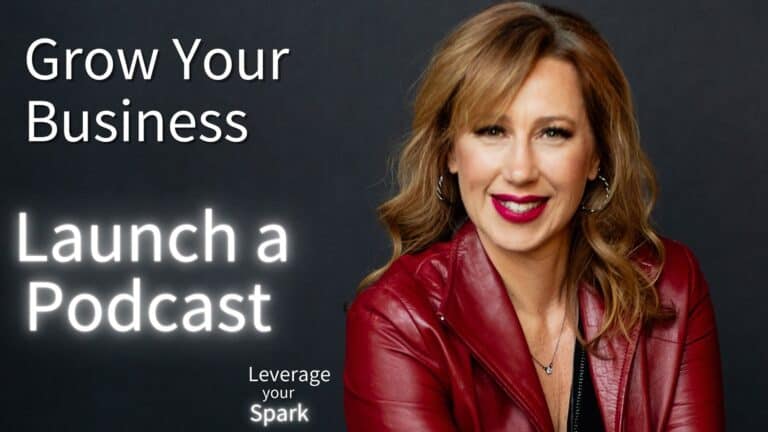Launch a Podcast to Grow Your Business

Recently, I sat down with Stacey Harris, the founder and CEO of Uncommonly More, to discuss why you should launch a podcast. There are a lot of reasons to add a podcast to your business marketing efforts, and she and I went through all of them. Want to listen to our interview? Check it out here! Below, I’ve gathered the pertinent points we discussed that will help you get started.
Listen in to Season 1: Episode 13
Leverage Your Podcast as a Business Asset
Just as your business website is a business asset, so is your podcast. But most of the time, people who launch a podcast use a social media platform to share and promote their podcasts. When they do that, they’re driving everyone to an Apple link. However, not everyone uses Apple as their preferred listening platform, so there’s that. No matter where you send them, if they’re not captive on your website, they have the opportunity to see all kinds of other podcasts. In essence, you could lose them.
Instead, let’s say you send listeners to your website to listen to or download a show. Now they’re captive and in your brand’s world. Once they’re there, you can share other pieces of content, push them to join your email list, or sell them your products and services.
You need to think about your website as your digital storefront—and the same is true when you launch a podcast. Your website is kind of the clubhouse where your podcast listeners get to hang out. And other piece of the puzzle is repurposing your podcasts into text that search engines can find, giving people another way to access your content. After all, search engines can’t listen to your words; they need text.
When you create text for your podcast, you make it searchable not only on the podcast platform but also on Google. Adding more context and driving listeners to your site isn’t only good for conversion, it’s great for discoverability. Remember that you don’t have to have the entire transcript either (although that’s good to have). You can just do truncated show notes that highlight the topics covered, along with some timestamped show notes. And remember to include a call to action!
Podcasts and Analytics
When you pay attention to analytics, you are able to make smarter business decisions. Armed with the data that comes from analytics, you’re able to spend less money on marketing and trial and error; instead, you gain an overall line of site on your business’s health and growth. But what should you be paying attention to when it comes to podcasts and analytics?
First of all, you need to ensure that you launch a podcast on a host that is providing analytics. Not all podcast hosts offer the same value when it comes to metrics. And keep in mind that, when it comes to podcasts and analytics, it’s still a little bit of the “wild wild west” out there—meaning there aren’t any uniform requirements around what a download means and the like.
If you’re being honest with yourself, downloads may be largely a vanity metric. Just because someone downloads the podcast doesn’t necessarily mean it’s been listened to. But it’s important to have some context around downloads as well. For instance, if you’re getting more than 121 downloads per episode on Libsyn, you’re doing better than half the podcasts listed there.
It’s important to realize that downloads aren’t the only thing to look at when it comes to analytics. If someone books a call on your calendar or reaches out and says, “Hey, I listened to your show,” you know you’re doing well. Continue that conversation by asking, “What show did you listen to? Do you have a favorite?”
Smart Business: Launch a Podcast
Smart business is all about creating repeatable systems and applying them in a way that works best for you to magnify your efforts. Some of the first questions people ask when they look to launch a podcast include: “How should I record my podcasts?” “Should I be scripting podcasts?”
The answer to these questions is the same—and ambiguous.
At the end of the day, the system and structure you use to record and share your show with the world are completely up to you.
Perhaps you should be asking yourself different questions, such as:
- Who is this podcast for?
- What will I be talking about?
- What do I want listeners to do next?
- How am I going to get listeners to that next step?
These are the important initial questions to ask yourself before you launch a podcast.
But back to those basics. GarageBand and Audacity are both free, so try those. As for scripting, do what works for you.
What it comes down to is this: The best podcast production system is the one you’re actually going to use.
Get Friendly with Technology
When you’re ready to launch a podcast, the easiest way to do it is with Anchor. As a host, you can record right into it. You can also record outside of Anchor and upload it there. GarageBand and Audacity are 100% free, and Anchor is not very expensive. Plus, all have extensive YouTube tutorials. Anchor is a great place to start for an all-in-one solution. It gives you the ability to add music and even place ads, so it’s a smart, easy option when you’re ready to launch a podcast.
Other tools include Libsyn, Blubrry, and Buzzsprout. The one you choose will ultimately come down to your goal, what you’re trying to do, and if you’re going to be a solo act or a guest-driven show.
If guests are part of your podcast strategy, try SquadCast or Zencastr. There’s also Zoom, if you want to try that option. Keep in mind that Zoom compresses your audio a little bit, allowing you less wiggle room in editing, but it can still work for many podcasters.
Remember that strategy for your podcast comes first, followed by technology. The way you’ll record and share the show will depend on what your goal is.
Keep Learning!
Get the 411 on everything podcasting—and check out Stacey Harris’ podcast—at UncommonlyMore.com. On her site, you’ll learn about training on how to launch a podcast. You might even find inspiration if you’ve been hesitant to start!

